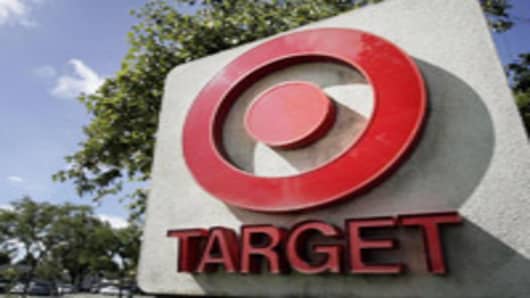Target said Tuesday its quarterly profit rose almost 13 percent, meeting Wall Street targets, but the retailer is planning more conservatively for the rest of the year because of the "more difficult economic environment" facing its shoppers.
Target , the second-largest U.S. discount chain behind Wal-Mart Stores Inc, said earnings rose to $686 million, or 80 cents per share, in its second quarter ended Aug. 4 from $609 million, or 70 cents per share, a year earlier.
Analysts, on average, had been expecting it to earn 80 cents per share, according to Reuters Estimates.
Retail stocks have been pressured in recent weeks as investors fret that the deteriorating housing market, rising U.S. mortgage defaults and higher gas and food prices are curbing consumer spending.
Wal-Mart reported a lower-than-expected quarterly profit and cut its full-year earnings forecast last week, saying "economic pressures" such as higher fuel prices have depleted shoppers' wallets.
But Target's sales at existing stores have outpaced those at Wal-Mart as its sales of cheap but trendy clothing and home decor by designers such as Isaac Mizrahi have helped to offset sales of lower-margin goods such as groceries. Wal-Mart is struggling in its clothing and home businesses.
"Target is showing very strong execution," said Craig Johnson, president of retail consulting firm Customer Growth Partners, adding that Target tends to cater to higher-income shoppers who are better able to weather economic bumps than Wal-Mart customers.
But Target's customers are not immune to woes and the retailer is factoring in the more difficult environment as it heads toward the holiday season.
"As we look to the remainder of the year, we are planning our business more conservatively," said President Gregg Steinhafel on a call with analysts.
Back-to-School Sales Off to Slow Start
Target said total quarterly revenue rose to $14.62 billion from $13.35 billion a year ago, while same-store sales -- a key retail gauge that measures sales at stores open longer than one year -- increased 4.9 percent.
The retailer said the back-to-school season, a critical shopping period for U.S. retailers that typically begins in July, got off to a slower-than-expected start.
But as the season has progressed, Target said business is performing at or better than planned, helping to recapture some of July's shortfall.
The company Monday reaffirmed its August same-store sales forecast of 4 percent to 6 percent growth. Target gave its sales estimate earlier this month and is schedule to report final August sales Sept. 6.
For the quarter, credit-card revenue rose to $453 million from $388 million a year ago. Target offers a Target Visa and another card that can be used only at its stores.
On a conference call, Chief Financial Officer Douglas Scovanner said Target has "a high degree of confidence in the continued health and prosperity of our credit card operations."
Scovanner also said the discount retailer's prospects of earning slightly more than $3.60 per share for the full year is roughly equal to the prospects of earnings slightly less.
Earlier, Bob Ulrich, Target chairman and chief executive officer, said in a statement the company still believes "that $3.60 remains within the range of likely outcomes for our full-year 2007 earnings per share" -- mimicking language the company used when it reported first-quarter results.
Analysts, on average, are expecting full-year earnings per share of $3.62, according to Reuters Estimates.
For the remainder of the year, Target expects its trend of mid-single digit comparable sales increases to continue, adjusted for shifts in the retail reporting calendar. But it expects "sharply lower" total sales growth in the fourth quarter due to an extra week in that period last year.
An extra week on last year's retail calendar has created reporting periods this year that are not exactly comparable to year-ago results.
Through Monday, Target's shares have risen almost 4 percent this year, while Wal-Mart shares are down close to 6 percent and the S&P Retail Index is down 7 percent.
Target shares were up 63 cents at $59.72 in early afternoon trading on the New York Stock Exchange.


